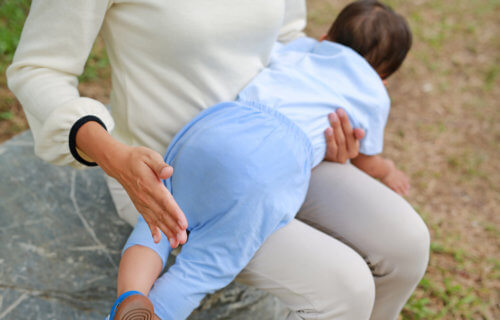CAMBRIDGE, Mass. — For children of a different era, a spanking was the typical punishment from mom or dad after misbehaving. While corporal punishment inside the home is still legal across America, society tends to frown on such disciplinary measures today. Now, a new study finds spankings may actually be harmful to a child’s brain development. Researchers from Harvard contend spanking a child causes developmental damage similar to if the youngster had been physically abused.
Study authors add children who have been assaulted and those who receive a spanking share similar brain scans. They add this form of punishment may affect how individuals make decisions and process situations for life.
Researchers identified neural responses in multiple regions of the prefrontal cortex that change following corporal punishment. The team notes the difference between abuse and punishment is a matter of degree, not type.
“We know that children whose families use corporal punishment are more likely to develop anxiety, depression, behavior problems, and other mental health problems, but many people don’t think about spanking as a form of violence,” says Associate Professor Katie McLaughlin, director of Harvard’s Stress & Development Lab, in a university release. “In this study, we wanted to examine whether there was an impact of spanking at a neurobiological level, in terms of how the brain is developing.”
How does a spanking affect the brain?
Researchers asked 147 children around ages 10 and 11 to sit in an MRI machine and watch a computer screen displaying different images of actors making fearful and neutral faces. Children with a history of receiving spankings showed greater activation in the prefrontal cortex in comparison those punished in other ways.
“There were no regions of the brain where activation to fearful relative to neutral faces differed between children who were abused and children who were spanked,” researchers note in their report.
“While we might not conceptualize corporal punishment to be a form of violence, in terms of how a child’s brain responds, it’s not all that different than abuse,” Dr. McLaughlin adds. “It’s more a difference of degree than of type.”
McLaughlin hopes the findings encourage families to find another way of disciplining their children. She adds the results might “open people’s eyes to the potential negative consequences of corporal punishment.”
“These findings aligned with the predictions from other perspectives on the potential consequences of corporal punishment,” researcher Jorge Cuartas notes. “By identifying certain neural pathways that explain the consequences of corporal punishment in the brain, we can further suggest that this kind of punishment might be detrimental to children and we have more avenues to explore it.”
Every child is different, but spanking comes with risks
Study authors say corporal punishment will naturally impact each child differently, with some being more resilient to such measures. However, Cuartas says it’s important to understand the dangers punishments like spanking to can have on child development.
“Following a precautionary principle, parents and policymakers should work toward trying to reduce its prevalence,” the study first author adds.
Previous studies have discovered that children whose families use corporal punishment are more likely to develop anxiety, depression, and other mental health problems later on. Several countries in South America and Europe have banned corporal punishment by parents. In the United States, it is still legal in 19 states to use corporal punishment in classrooms.
The findings appear in the journal Child Development.
SWNS writer Joe Morgan contributed to this report.
